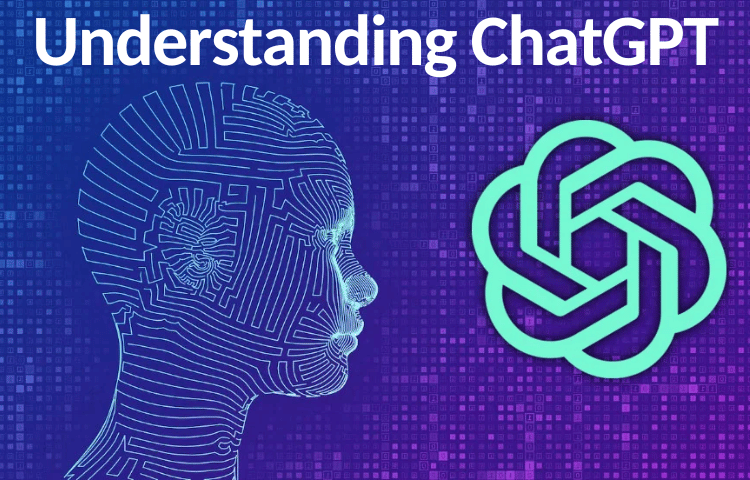It’s been making waves around the globe. Many people are talking about it—on Twitter, Facebook, Instagram, Reddit, Telegram, websites, blogs—everywhere! Celebrities are subconsciously advertising it, writers are threatened by it, moralists are concerned about it, and business-minded people are making money off of it. What is it? What is ChatGPT? In this post, you will learn what ChatGPT is and understand its usage and applications.
What is ChatGPT?
Developed by OpenAI and built on the GPT-3.5 architecture, ChatGPT is a chatbot powered by a sophisticated language model. ChatGPT has exceptional conversational abilities; surprisingly, it can provide responses that closely resemble those of a human. In fact, you can chat with it and expect to get responses as if you were chatting with a real human being.
The primary function of large language models like ChatGPT is to predict the next word in a series of words, which enables it to interact and engage in dialogue seamlessly.
RLHF, which stands for Reinforcement Learning with Human Feedback, is an extra layer of training that involves receiving input from humans to assist ChatGPT in developing the ability to generate satisfactory responses while following instructions to the letters—sometimes.
ChatGPT is trained on an extensive collection of online content, including websites, images, articles, and even down to social media posts. It also utilizes real-time conversations, primarily in English, with human contractors employed by OpenAI. During its training process, ChatGPT learns to imitate the grammatical structure and writing style of the content it has processed, enabling it to adopt frequently used phrases and reflect them in its responses.
That’s not all; it gains the ability to identify shapes and patterns in images like animal pictures, kid pictures, and even clothing, and a host of other objects. ChatGPT can associate words and phrases with these shapes and patterns, allowing users to ask ChatGPT to explain the content of a picture. For example, you can ask ChatGPT to identify what a dog is eating in a photo.
Who made ChatGPT?
This is a very good question to ask. The wonders of ChatGPT have raised a lot of eyebrows. The short answer is OpenAI created ChatGPT, and it was launched on Nov. 30, 2022. By the way, OpenAI is an AI and research company.
How does ChatGPT Work?
To understand how ChatGPT works, we have to understand the mechanism behind it, which is already hinted in the second half of the name itself, “GPT.” GPT is an acronym that stands for “Generative Pre-trained Transformer.” It employs specialized algorithms known as transformers—a set of algorithms adept at identifying patterns over lengthy sequences of data. The transformer is trained to predict not only the next word in a sentence but also the subsequent sentence in a paragraph and the following paragraph in an essay—just like humans do. As a result, it can maintain coherence and continuity in extended passages of text to generate human-like responses.
How Much does ChatGPT Cost?
For the most part of it, ChatGPT is free. The earlier versions and the current version of ChatGPT are free to use for every user, regardless of where they are accessing it from. You can use ChatGPT through a dedicated website on the browser of your choice. You will need to create an account to keep the history of your chat for future purposes. If you wish to enjoy priority access, you can opt for the $20/month subscription. This premium version of ChatGPT was launched on Feb. 1, 2023. According to the chief of OpenAI, Sam Altman, running ChatGPT is quite expensive and may have to be unavoidably monetized in the nearest future, as he stated that each generated response averages single digits cents in terms of cost.
Is ChatGPT a Big Deal?
ChatGPT is definitely a big deal. But how big it is will be dependent on the individual that is asking and how they plan to utilize it. However, one thing is obvious and clear—the splash it made when it was launched. And ChatGPT looks amazing, promising, and scary at the same time. Even Elon Musk admitted this when he said, “we are not far from dangerously strong AI.” In case you didn’t know, Elon Musk was part of the founders of OpenAI before he left for other projects.
Given the stats of its usage, it is safe to say it is a very welcomed idea by the people. OpenAI’s chief, Sam Altman claimed that over 1 million users registered on ChatGPT in its first five days after launching. Swiss Bank UBS, in their analysis, revealed that ChatGPT is the fastest growing consumer application of all time. According to the analysis, ChatGPT gathered 100 million active users in January—barely two months after its launch. For context, it took TikTok, the second on the list, 9 months to hit 100 million active users. The third on the list, which is Instagram, hit the threshold in 2 and a half years.
How are People Utilizing ChatGPT?
ChatGPT can be used in different ways, and that is one of its winning edges. It can answer simple and basic questions like, “what do you know about developclicks.com?” “What should I do if my phone drops into water?” It can also help you to compose essays, and due to its ability to identify objects in images, it also excels in describing art in great detail. With ChatGPT, you can create and write simple codes. The possibilities with ChatGPT are almost endless. It has become an unpaid writing partner for most writers, and they never shy away from using a little help from it. ChatGPT can be your everyday chitchat friend that you can chat with and discover new things with. If you are bored, you can ask it to tell you a joke or write you a poem.
What are ChatGPT’s Limitations?
It’s not a perfect machine that can do everything you want it to do anytime you want. It comes with its limitations—expectedly. Getting the best out of ChatGPT will require you, the human being, to ask your questions in certain ways. For ChatGPT to understand you better, you have to use specific terms it can easily pick up. You want to make sure your grammars are correct and not too complex for it to understand. The worse part is that ChatGPT would rather guess what you mean than ask for clarifications. The response, in this case, will leave you questioning your knowledge.
Another limitation of ChatGPT is its quality of response. Perhaps, the founders intentionally made ChatGPT to be simple and unsophisticated with its responses. But most of the wonderments usually stop after several trials. Later, you begin to notice the low quality of response and how some answers are outrightly wrong or just unnecessarily wordy. Because of this, developers’ question-and-answer platform, StackOverflow, has temporarily banned responses generated from ChatGPT.
According to a post by StackOverflow moderators, the main issue with ChatGPT is that even though it generates responses quickly and appear plausible, they often contain errors. Detractors contend that these tools excel at arranging words in a logical sequence based on statistics but lack the ability to comprehend the intended meaning or determine the accuracy of the information presented.
Also, educational platforms like Turnitin flag ChatGPT-generated answers and solutions to questions and problems, respectively.
Furthermore, ChatGPT is constrained by its dataset, which only covers 2021. Consequently, the AI is unaware of any developments or news that have transpired since then, which means that certain inquiries will not yield any meaningful responses. Asking ChatGPT what the best budget smartphones are for the year 2023, this was the response: “As an AI language model, I don’t have information about events that will occur in the future beyond my knowledge cutoff date, which is September 2021. However, I can provide you with a general response based on the best budget smartphones available at that time…” One can, at least, be grateful for its honesty and truthfulness.
Is there a Tool that can Recognize ChatGPT Text?
The short answer is yes. One quick way to confirm if a response was generated and directly copied from ChatGPT is to paste the text and ask, “did you write this? ChatGPT can recognize its text and tell you whether it wrote it. It can still be able to know if a minor tweak is done on the text.
Another tool that recognizes ChatGPT text is Copyleaks. This platform is used by academicians to detect responses generated by AI writers, including ChatGPT. Just like this tool, there are many other prolific AI content detectors, including Writer AI Content Detector, GPT-2, and Content at Scale AI Content Detection. All of these tools are not always correct with their assessments. Sometimes, a non-edited AI-generated response can pass as 100% human-like. Other times, a human-written text can be flagged as AI-generated.
Are People Worried about ChatGPT?
Yes, a lot of people are worried about ChatGPT, and for many different reasons. A professor worries that his or her student will abuse the use of ChatGPT. Many teachers have accused students of using ChatGPT for their assignments and group projects, beating the whole and fundamental essence of education—learning how to read, understand and write. ChatGPT excels at writing essays on any topic you can think of. But this is not to say that it writes essays with correct information and claims always. As a matter of fact, ChatGPT says that its responses are not intended to be taken as fact, and advises users to verify any information they receive from it. And that takes us to the next worry, i.e., misinformation.
Sometimes, it appears that ChatGPT is all too concerned about the coherence of texts than their accuracy and integrity. As mentioned earlier, ChatGPT would rather guess what you mean to ask instead of asking for clarifications. This makes it a bit dangerous to rely on when it comes to the accuracy and integrity of information. In a nutshell, ChatGPT can spread misinformation based on the misinformation it gathers from the internet.
Furthermore, some writers fear that AI will take over their jobs. The prospect of ChatGPT is very enticing to content creators, and what is even more appealing is how fast it does the job. Within seconds, ChatGPT can create copies of marketing content, generate essays, write projects (with sources and citations), and even come up with bright ideas. These chunks of can-do’s of ChatGPT posit it as a direct competitor with human writers, or maybe not.
Is ChatGPT Truly Taking Over?
AI taking over the world may not be happening yet, but according to Altman, human-like intelligence in AI may not be too far off. In response to Musk’s concerns about the dangers of strong AI, Altman tweeted that he believes we are approaching the development of an AI that could pose a significant cybersecurity risk. He also thinks that achieving real AGI, or artificial general intelligence, could be possible within the next ten years, making it crucial for us to take the risk of such a development extremely seriously.
Additionally, he observed that it is fascinating to witness individuals beginning to discuss whether robust AI systems should act in the manner that users desire or as their creators intend. The issue of which values we should align these systems with will be among the most critical debates that society will ever encounter.
Are there Alternatives to ChatGPT?
While ChatGPT is currently the chatbot creating a lot of excitement, there are numerous other alternatives that are equally competent and might even be more suitable for your requirements. Despite ChatGPT’s broad capabilities, there are several significant drawbacks to the AI chatbot, such as the fact that its free version is frequently at full capacity. If you are interested in exploring the realm of AI chatbots and writers, there are several other options worth considering, such as YouChat, Conch AI, Chatsonic, and Jasper.
Is ChatGPT a Good or Bad Thing?
ChatGPT is a highly developed chatbot that can potentially simplify people’s lives and aid in performing mundane everyday tasks, such as composing emails or searching the web for information. Nevertheless, certain technical intricacies need to be resolved before it can be extensively utilized to avoid unfavorable outcomes such as the proliferation of false information. Instead of making an enemy of ChatGPT, you should take advantage of it, and utilize its best resources. As a writer, it comes in handy when brainstorming; as a developer, it can help you code; as an artist, it can give you artistic ideas, and so on.










